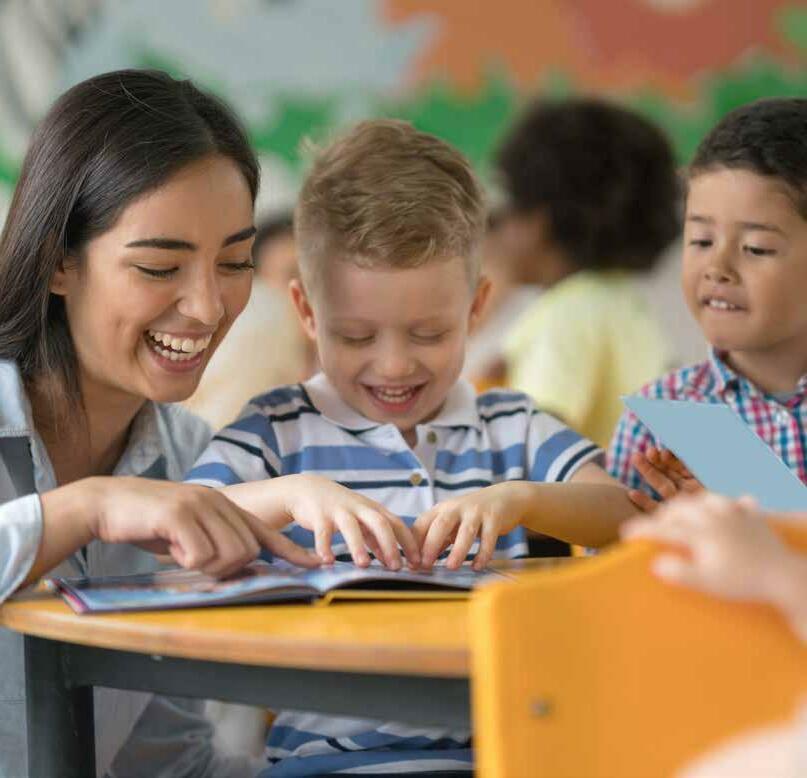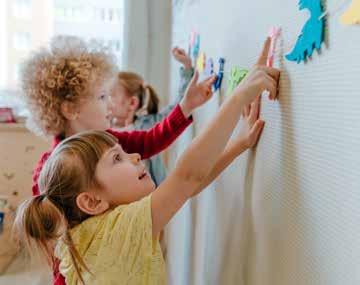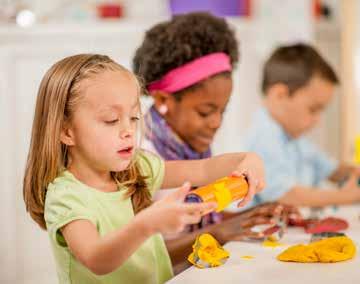
4 minute read
The children are the curriculum
CAECE – College for Australian Early Childhood Educators
Curriculum encompasses all the interactions, experiences, routines, and events, planned and unplanned that occur in an environment designed to foster children’s learning and development.
An important quote for the child directed learning environment, where children develop a range of skills and processes such as problem solving, inquiry, experimentation, hypothesising, researching, and investigating (EYLF, Outcome 4.2), and provide children with opportunities for active involvement and a variety of rich and meaningful inquiry-based experiences (EYLF, Page 34). There are many challenges implementing the curriculum. Challenge yourself to reflect on the curriculum, develop ideas and actions that support inquiry and recognise interactions, experiences, routines, and events do influence our program.
The interactions
An educator promoting inquiry is allowing the children to lead, investigate, explore, and research to come to their own ideas about how things work. Children must have power to make decisions, ask questions and put ideas into action. We need to allow children to lead this process and avoid temptation to give them answers, predict for them or tell them the outcome.
Really see things from a child’s perspective, give them control to decide the paths their inquiry will take. Let them build things that are going to fall, let them make the mess.


The skills that come are going to be just as valuable in the learning process. Children can participate in routines and processes to reflect on why things did not work, how they need to change their ideas and what they can do differently next time and give them a next time.
The experiences
We need to let go of reasoning and thinking on limitations for the curriculum. It can be difficult to provide a variety of rich and meaningful inquiry-based experiences (EYLF, page 34) in the confines of the learning environment, service policies, risk assessments and general routines and demands of our role as educators. The planning, program, and documentation needs to work for us as well as our own problem solving and creativity. We may not be able to witness the full operation of a functional coal mine that the children are interested in, in the world of technology we have so many opportunities that break those limitations – we need to put in the groundwork and make them work for us. Experiences may need to adapt to suit the context but can certainly come into the environment with technology available to us. In an online world of YouTube, internet, face time, printers, instant photos, mobile devices, and more – the possibilities to watch a coal mine in operation could make its way into the environment. Another barrier to experiences is availability of resources to provide the variety of rich and meaningful inquiry-based experiences to meet the interest for every child. Physical storage and access to resources is just the beginning. The challenge to get resources and respond to children’s interests before the child finds something else to focus their attention on is a challenge for every educator. Organisation is key, as educators we must make the environment work for us. Every shelf, every storage area and every cupboard must have a purpose and work for you and the children to provide the resources and materials that will really allow children to explore their interest and test ideas and inquiry processes that are so important!
Routines
If routines are not flexible and supportive of children’s interests, then interactions and experiences are influenced. Do not assume that inquiry-based opportunities only present themselves during the timeframe in the routine for “planned experiences.” Children may eat later, learning may not fit into the timetable of the routine, we need to come back to it or have the time we need to find the answers we are looking for. Educators need negotiation skills; negotiate with other staff, advocate keeping lunch warm until learning is done. Advocate importance of routines to educators who do not value the process. Think about how routines work best in our environment, and how we involve children in routines and not just have them participate in the timetable. Routines need to contribute to children’s developing autonomy and independence (NQF, Page 189). Supporting routines may mean having all resources and equipment organised to be self-sufficient in our learning environment. Make a list of the tasks you do for children; think of ways to support children to do this themselves and the resources and equipment that they need to do this.
Events
The show must go on and learning is the show. Events can be formal, planned events including excursions, incursions, visitors, special events and our calendar of events. But what events really mean are those events that impact the curriculum and influence the success its interactions, experiences, and routines. Educator absences, illness, availability, children’s attendance, availability of resources and equipment, sharing resources, service budgets, developing risk assessments and the list goes on. We can all create reasons why it is hard to let the children’s ideas and interests lead the curriculum and the program. We need to learn to overcome obstacles, find ways around these challenges. Set yourself up with systems that support the learning to be the show and let the learning go on. Reflect on your curriculum, reflect critically on your interactions, experiences, routines, and events and what is impacting on them for you. Challenge your excuses and reasons, develop your strategies to make them influence the curriculum in a positive way and let the children be the curriculum.










